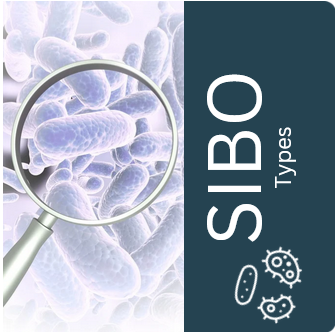Weight Gain or Weight Loss with SIBO?
Content
1. What is SIBO?
1.1 SIBO Diagnosis
1.2 SIBO Treatment
2. Weight Changes due to SIBO?
2.1 Weight Gain due to SIBO?
2.2 Weight Loss due to SIBO?
2.3 Conclusion: Weight and SIBO
1. What is SIBO?
“Small Intestinal Bacterial Overgrowth” (SIBO) is a gastrointestinal condition in which bacteria produce inappropriately high levels in the small intestine. In healthy patients, the small intestine is only lightly colonized, while the colon contains the dominant part of the gut microbiome. When this balance is disrupted, excess bacteria in the small intestine produce gases like hydrogen and methane, leading to symptoms such as abdominal pain, bloating, gas, diarrhea, constipation, belching, fullness, and heartburn. These issues are often mistaken for IBS, making SIBO an important differential diagnosis in many cases.
1.1 SIBO Diagnosis
The most common testing method for diagnosing SIBO is the SIBO breath test, which measures elevated hydrogen or methane levels. During the test, the patient ingests lactulose, lactose, glucose, or fructose, and exhaled breath samples are collected (1). Human cells do not produce these gases—only bacteria do. The timing of the gas increase indicates whether the bacteria are active in the small or large intestine. A positive result confirms bacterial overgrowth and allows for targeted treatment approaches. You can finde out more here.
1.2 SIBO Treatment
There are several therapeutic approaches to SIBO treatment, including specialized diet strategies, herbal or pharmaceutical antibiotics, and pre- or probiotics. Treatment plans are adapted to the dominant bacterial type and the symptoms of individual patients. In IMO (Intestinal Methanogen Overgrowth), methane-producing archaea may require specific attention.
2. Weight Changes due to SIBO?
Various studies have linked SIBO to weight-related conditions, although the direction of the impact differs. Some patients experience weight gain, while others suffer from weight loss due to nutrient malabsorption. These variations depend on the type of bacteria involved, gas levels, intestinal motility, and coexisting health conditions.
2.1 Weight Gain due to SIBO?
Weight gain in SIBO cases has been attributed to several mechanisms:
A 2006 study by Turnbaugh et al. found that changes in the microbiome affect body weight. Germ-free mice colonized with microbiota from obese mice gained more weight than those colonized with lean microbiota. This suggests that certain bacteria are more efficient at extracting energy from foods, transferring extra calories to the host. (2)
In 2012, Basseri et al. showed that patients with elevated methane levels had a higher BMI. Methane-producing bacteria can create short-chain fatty acids (SCFAs), which serve as an energy source for the intestinal lining. Methane also slows intestinal transit time, extending the contact time between food and the gut, allowing for greater nutrient and energy absorption. (3) (3)
A 2019 study reported that post-gastric bypass patients who tested positive for SIBO gained more weight over time than patients with negative tests. Although exact mechanisms were not explained, the association highlights the need for post-surgical monitoring. (4)
Notably, SIBO is more common following gastric bypass surgery. (5)
2.2 Weight Loss due to SIBO?
SIBO is also associated with weight loss, particularly in cases involving diarrhea and elevated intestinal motility. This reduces nutrient absorption by shortening the contact time between food and the intestinal lining. Malabsorption can lead to nutrient deficiencies and negative health effects. (6,7)
A 2022 study showed weight loss and lower BMI in SIBO-positive patients with Crohn’s disease. (8) This highlights that SIBO’s impact on weight is multifactorial and depends on the individual’s gut health and other coexisting conditions.
When weight loss occurs, monitoring the body’s nutrient status is essential. Nutrient testing can guide medical approaches to avoid long-term complications.
2.3 Conclusion: Weight and SIBO
SIBO can be associated with either weight gain or weight loss, depending on the dominant bacteria, metabolic activity, and overall gut function. Coexisting conditions and metabolic disorders may influence how SIBO impacts body weight.
Regardless of weight direction, symptomatic SIBO should be treated under medical supervision. A balanced diet, adequate nutrient intake, and lifestyle modifications—such as movement and mental well-being—support a healthy metabolism. Regular contact with a healthcare provider ensures that treatment is responsive to individual needs and evolving symptoms.
References
- Rezaie A, Buresi M, Lembo A, Lin H, McCallum R, Rao S, Schmulson M, Valdovinos M, Zakko S, Pimentel M. Hydrogen and Methane-Based Breath Testing in Gastrointestinal Disorders: The North American Consensus. Am J Gastroenterol. 2017 May;112(5):775-784. doi: 10.1038/ajg.2017.46. Epub 2017 Mar 21. PMID: 28323273; PMCID: PMC5418558.
- Turnbaugh PJ, Ley RE, Mahowald MA, Magrini V, Mardis ER, Gordon JI. An obesity-associated gut microbiome with increased capacity for energy harvest. Nature. 2006 Dec 21;444(7122):1027-31. doi: 10.1038/nature05414. PMID: 17183312.
- Basseri RJ, Basseri B, Pimentel M, Chong K, Youdim A, Low K, Hwang L, Soffer E, Chang C, Mathur R. Intestinal methane production in obese individuals is associated with a higher body mass index. Gastroenterol Hepatol (N Y). 2012 Jan;8(1):22-8. PMID: 22347829; PMCID: PMC3277195.
- Coelho LK, Carvalho NS, Navarro-Rodriguez T, Marson FAL, Carvalho PJPC. Lactulose Breath Testing Can Be a Positive Predictor Before Weight Gain in Participants with Obesity Submitted to Roux-en-Y Gastric Bypass. Obes Surg. 2019 Nov;29(11):3457-3464. doi: 10.1007/s11695-019-04006-z. PMID: 31187458.
- Sabate JM, Coupaye M, Ledoux S, Castel B, Msika S, Coffin B, Jouet P. Consequences of Small Intestinal Bacterial Overgrowth in Obese Patients Before and After Bariatric Surgery. Obes Surg. 2017 Mar;27(3):599-605. doi: 10.1007/s11695-016-2343-5. PMID: 27576576.
- Efremova I, Maslennikov R, Poluektova E, Vasilieva E, Zharikov Y, Suslov A, Letyagina Y, Kozlov E, Levshina A, Ivashkin V. Epidemiology of small intestinal bacterial overgrowth. World J Gastroenterol. 2023 Jun 14;29(22):3400-3421. doi: 10.3748/wjg.v29.i22.3400. PMID: 37389240; PMCID: PMC10303511.
- Jung SE, Joo NS, Han KS, Kim KN. Obesity Is Inversely Related to Hydrogen-Producing Small Intestinal Bacterial Overgrowth in Non-Constipation Irritable Bowel Syndrome. J Korean Med Sci. 2017 Jun;32(6):948-953. doi: 10.3346/jkms.2017.32.6.948. PMID: 28480652; PMCID: PMC5426230.
- Stepanov, Y., Titova, M., & Nedzvetska, N. (2022). Prevalence of small intestinal bacterial overgrowth syndrome among patients with inflammatory bowel disease and its impact on nutritional status and clinical manifestations. GASTROENTEROLOGY, 55(3), 166–171. https://doi.org/10.22141/2308-2097.55.3.2021.241586





















